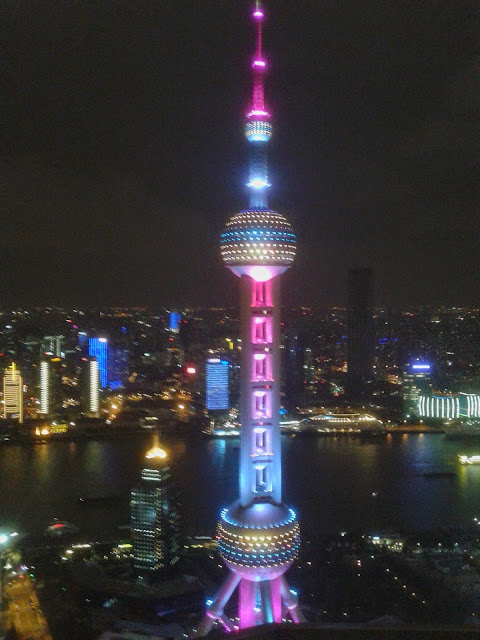Anthem
Anyone who has read George Orwell's 1984 may find some resonance in Ayn Rand's Anthem. They both depict a futuristic world where those in power exploit the collective mass in the name of brotherhood, although the two stories differ in plots, emphasis and style.
The terror of collectivism is vividly played out in 1984 with all the Big Brother's monstrous tactics of control, for rooting out dissidents, nibbing deflecting thoughts at their buds, crushing all chances of opposition, therefore, eternally clinging to the absolute power of leadership. It is a horror story taking the evil manifestation of one's ego to the extreme, at the expenses of the free will of all the others - the North Korea kind of world.
Anthem's world is no doubt similar, though different in details and the sense of severity in terms of suffering. In fact, Ayn Rand's picture of the world is just a sketch with a surreal impression to it. It was intentionally left vague for imagination I guess. For the story's emphasis is on the sentiment conveyed - one of desperation and despair. But it did not feel so oppressive as in 1984. After all, the big difference from 1984 is that, in Anthem, free will defeats brotherhood - every individual ego is as important as the next person's.
It is intriguing that a person's ego is so worshipped in Ayn Rand's literature. In fact, the characters in her stories often took heroic manifestation of one's ego to the other extreme from that of the monstrous Big Brother, without any compromise. And when free will declares victory over collectivism in the end, it always feels uplifting and motivating, that glory belongs to those who stay true to the clear mind of reasoning.
Her stories are always thought-provoking, not least for the contemporary contentions to the merits of individualism. While her ideal of free-willing individualism is admirable, to what extent could and should it be sustained against the collective agenda, say, in a corporate setting, is debatable. Life for everyone, as a matter of fact, is made up of trade-offs and compromises, or there will be no peace at all. But to compromise does not necessarily mean to surrender one's free will.
Let's not forget also that knowledge is always imperfect and incomplete until when judgment is to be passed in hindsight, when even then it may still remain far from perfect and absolute. The ground can always shift with new information coming to light. Thus, arguably, that makes Ayn Rand's advocacy more admirable: "Throughout the centuries there were men who took first steps down new roads armed with nothing but their own vision."
But people cannot be all heroes in reality. Everyone has to play ball, as part of a team to survive in any society, organization, and even family. A team member can still always think for himself and does not necessarily turn into one of Ayn Rand's villains who does not think and judge with free will - ie, "the second-handers and the selfless" in her words.
And selflessness is not a crime, especially when it is interpreted in Buddhism, which teaches that the clinging to one's ego is the source of most human sufferings in the world. Surely Ann Rand does not believe in Buddhism. In fact, she is clearly an atheist as evident from her worship of mankind in defiance of any gods.
Ayn Rand's ideals of rationality and integrity is refreshing as Buddha's teaching is enlightening. Though it seems mind-boggling to reconcile between the extremities of thoughts, between her advocated selfishness and the Buddhist selfless tranquility, there should be enough middle ground for soul-searching?
The terror of collectivism is vividly played out in 1984 with all the Big Brother's monstrous tactics of control, for rooting out dissidents, nibbing deflecting thoughts at their buds, crushing all chances of opposition, therefore, eternally clinging to the absolute power of leadership. It is a horror story taking the evil manifestation of one's ego to the extreme, at the expenses of the free will of all the others - the North Korea kind of world.
Anthem's world is no doubt similar, though different in details and the sense of severity in terms of suffering. In fact, Ayn Rand's picture of the world is just a sketch with a surreal impression to it. It was intentionally left vague for imagination I guess. For the story's emphasis is on the sentiment conveyed - one of desperation and despair. But it did not feel so oppressive as in 1984. After all, the big difference from 1984 is that, in Anthem, free will defeats brotherhood - every individual ego is as important as the next person's.
It is intriguing that a person's ego is so worshipped in Ayn Rand's literature. In fact, the characters in her stories often took heroic manifestation of one's ego to the other extreme from that of the monstrous Big Brother, without any compromise. And when free will declares victory over collectivism in the end, it always feels uplifting and motivating, that glory belongs to those who stay true to the clear mind of reasoning.
Her stories are always thought-provoking, not least for the contemporary contentions to the merits of individualism. While her ideal of free-willing individualism is admirable, to what extent could and should it be sustained against the collective agenda, say, in a corporate setting, is debatable. Life for everyone, as a matter of fact, is made up of trade-offs and compromises, or there will be no peace at all. But to compromise does not necessarily mean to surrender one's free will.
Let's not forget also that knowledge is always imperfect and incomplete until when judgment is to be passed in hindsight, when even then it may still remain far from perfect and absolute. The ground can always shift with new information coming to light. Thus, arguably, that makes Ayn Rand's advocacy more admirable: "Throughout the centuries there were men who took first steps down new roads armed with nothing but their own vision."
But people cannot be all heroes in reality. Everyone has to play ball, as part of a team to survive in any society, organization, and even family. A team member can still always think for himself and does not necessarily turn into one of Ayn Rand's villains who does not think and judge with free will - ie, "the second-handers and the selfless" in her words.
And selflessness is not a crime, especially when it is interpreted in Buddhism, which teaches that the clinging to one's ego is the source of most human sufferings in the world. Surely Ann Rand does not believe in Buddhism. In fact, she is clearly an atheist as evident from her worship of mankind in defiance of any gods.
Ayn Rand's ideals of rationality and integrity is refreshing as Buddha's teaching is enlightening. Though it seems mind-boggling to reconcile between the extremities of thoughts, between her advocated selfishness and the Buddhist selfless tranquility, there should be enough middle ground for soul-searching?



Comments